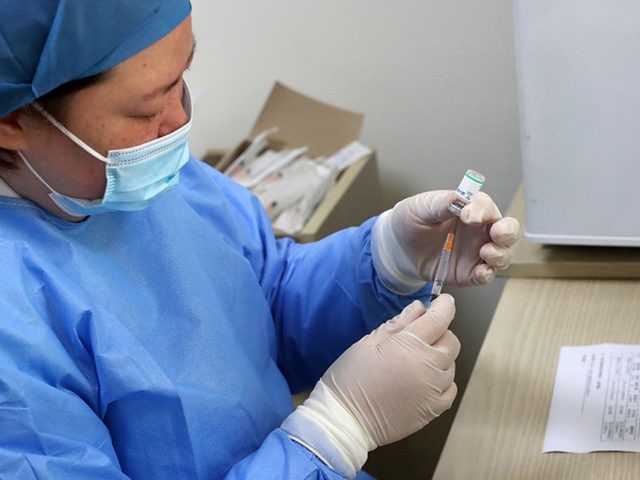Beijing public health workers are the least willing to receive a Chinese-made coronavirus vaccine candidate compared to their counterparts elsewhere in China, a study by the Chinese Center for Disease Control and Prevention (CDC) revealed this week.
The study’s research team, led by China CDC program leader Kong Qingfu, published its findings through the Chinese Journal of Vaccines and Immunization on March 2. The CDC’s National Immunization Program researchers, who conducted the survey, “concluded that the higher the education level of staff, the less willing they were to get the jab.”
Less than 74 percent of all CDC staff in Beijing, China’s national capital, would receive a Chinese-made coronavirus vaccine candidate voluntarily, according to the study.
Outside of the capital, in provinces such as Shandong, Sichuan, and Hubei — the epicenter of China’s coronavirus outbreak in late 2019 — nearly 90 percent of public health staff said they would voluntarily get a coronavirus vaccine candidate manufactured in China.
Over 3,000 public health workers across China participated in the survey from May to June of last year. The study’s researchers noted Tuesday that the results of the poll “should be treated with caution since about a third of CDC employees did not respond.”
“CDC staff are a key target population for Covid-19 [Chinese coronavirus] vaccination due to their high risk of infection,” Kong, the research team’s leader, wrote in the report.
The survey’s researchers said it was not clear why public health workers in Beijing were the least willing to be vaccinated against the Chinese coronavirus. They suggested medical staff in Beijing “perhaps felt they were less at risk than their colleagues elsewhere” due to the city’s premier status as China’s national capital and political center which ostensibly affords Beijing greater priority for state-funded pandemic control measures.
Beijing has seen some of the strictest coronavirus lockdowns in China over the past year and especially over the last several weeks due to a recent surge of cases in the city and its surrounding province, Hebei, starting in early January. Chinese health authorities locked down 1.7 million residents of southern Beijing’s Daxing district on January 19 to prevent new, locally detected coronavirus cases from spreading across the city’s population of nearly 22 million people.
“Daxing district in southern Beijing … has been sealed off from the rest of the country after six infections were found there. The total number of cases in Beijing stands at 15,” Bloomberg News reported at the time.
Daxing’s government banned all 1.7 million residents of the district from leaving Beijing “unless they have received special permission from the authorities” and tested negative for coronavirus in the past three days.
“Residents from five Daxing apartment complexes have been barred from leaving their homes from Wednesday [January 20],” Bloomberg reported, citing district government officials.
Daxing also shut down all kindergarten, primary, and secondary schools and ordered students to study from home. The district prohibited gatherings of 50 or more people, instructing that “weddings should be postponed and funerals simplified,” Agence France-Presse reported of the strict measures.

COMMENTS
Please let us know if you're having issues with commenting.